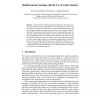Free Online Productivity Tools
i2Speak
i2Symbol
i2OCR
iTex2Img
iWeb2Print
iWeb2Shot
i2Type
iPdf2Split
iPdf2Merge
i2Bopomofo
i2Arabic
i2Style
i2Image
i2PDF
iLatex2Rtf
Sci2ools
114
Voted
ECAI
2008
Springer
2008
Springer
Reinforcement Learning with the Use of Costly Features
In many practical reinforcement learning problems, the state space is too large to permit an exact representation of the value function, much less the time required to compute it. In such cases, a common solution approach is to compute an approximation of the value function in terms of state features. However, relatively little attention has been paid to the cost of computing these state features. For example, search-based features may be useful for value prediction, but their computational cost must be traded off with their impact on value accuracy. To this end, we introduce a new cost-sensitive sparse linear regression paradigm for value function approximation in reinforcement learning where the learner is able to select only those costly features that are sufficiently informative to justify their computation. We illustrate the learning behavior of our approach using a simple experimental domain that allows us to explore the effects of a range of costs on the cost-performance trade-o...
Related Content
| Added | 19 Oct 2010 |
| Updated | 19 Oct 2010 |
| Type | Conference |
| Year | 2008 |
| Where | ECAI |
| Authors | Robby Goetschalckx, Scott Sanner, Kurt Driessens |
Comments (0)

